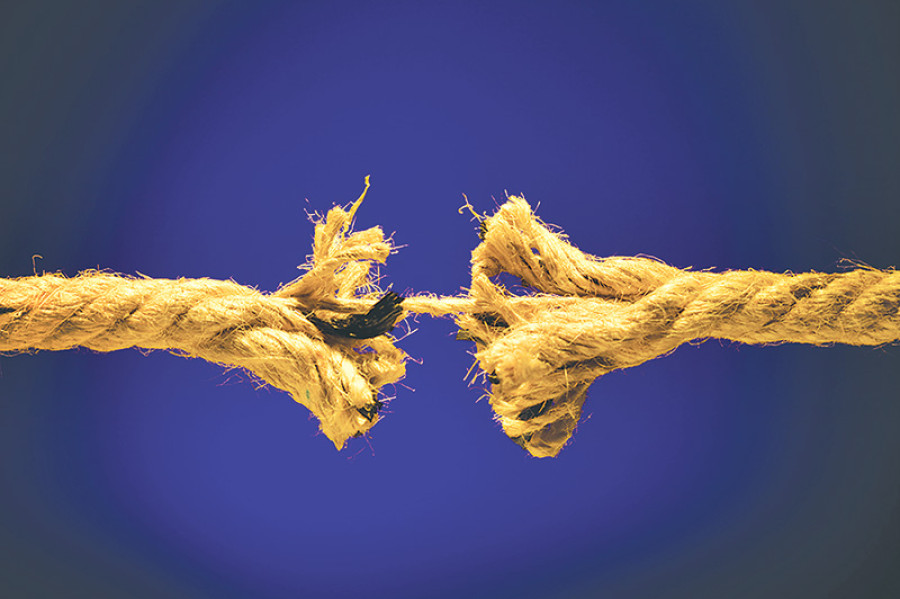Opinion
Breaking through the veil
The so-called left alliance has sent shockwaves through Nepal’s political and media spheres.
Pramod Mishra
The so-called left alliance has sent shockwaves through Nepal’s political and media spheres. Except for top actors such as Pushpa Kamal Dahal, KP Oli and their immediate mediators, other party members were unaware of the impending alliance. In fact, when I met Baburam Bhattarai in a posh Kathmandu hotel, first one-on-one and then, at his invitation, as part of a group of well-known columnists, scholars and researchers of different ethnicities and political persuasions from Kathmandu, he asked us to advise him as to what future course of action he should take to steer Nepal onto the path of development and prosperity.
Confused paradigm
In response, some said he should be aggressive in his messaging because he appeared confused. One columnist, known for his anti-marginalised rhetoric, told him that he should not anger and alienate his Bahun-Chettri-Dashnami constituency, because they would never take it lying down and this would prove disastrous for him. A Madhesi intellectual, known for his incisive analysis of the Madhes situation, informed him that the marginalised, especially the Madhesis, have grown sick and tired of being condemned as mere voters; they now want to be leaders themselves so that they can have equal control over pens (bureaucratic power), guns (security forces) and keys (state treasury). The Janajatis are still happy to be voters but the situation is changing fast.
When it came to my turn, I said that three hot button issues arouse passionate responses from Nepalis: Nationality, Inclusion and Development. The wrong people have been defining all three issues erroneously and leading Nepal and Nepalis on an ominous path. Oli and his ilk have been pitting Madhesis against Pahadis, and India against China in the name of nationality by implicitly and explicitly deploying Mahendrist nationalism. Therefore, the need of the hour is to redefine nationalism as plural and multicultural. Many extremists in the Tarai are wrongly defining inclusion by pitching Madhesis against Pahadis and defining separatism as inclusion. But Nepali politics cannot go forward without resolving the issue of inclusion. And many neo-liberal and mafia capitalists want development at the expense of Nepal’s ecological wellbeing.
I told him that, despite his enemies’ smear campaign against him, he still possessed the credibility to mobilise people in the streets and unite the leaders of the Madhesi, Janajati and progressive hill castes to build a common front to restructure the Nepali state. The next day I met an academic who pointed out that Bhattarai is no different from any other politician in Nepal in matters of abusing money in politics. I challenged his assumption as hearsay propaganda by malicious people who lost much when Nepal became a republic and the marginalised came to have a clear voice with which they could demand inclusion and state structuring. The same evening, I met a well-known editor who reiterated the academic-columnists’ opinion and said that Bhattarai is on the verge of becoming just a professor and a political analyst, and that Kathmandu’s middle classes have lost faith in him.
The left is dead
The reason I’m spending so many words on Baburam Bhattarai is to understand the nature and composition of this so-called left alliance. It is clear now that some kind of desperation drove Pushpa Kamal Dahal and Baburam Bhattarai to take shelter under Oli’s UML umbrella. Did the desperation stem from their realisation that their and their parties’ political future was over, because the identity horse on which they had ridden to thrust themselves onto Nepal’s political centre-stage no longer belonged to them after the 16-point alliance with the Congress, the Maoists and the UML, and the resulting flawed constitution? Is it also because the winning horse of nationalism and nationality now solely belonged to KP Oli and his new UML—the rightist party that takes the name of the left? Dahal and Bhattarai now clearly want to ride a different horse to glory. And who knows, perhaps they can even adopt some of Mahendra’s tactics in the coming parliamentary election to once again fool the people in the short term to inflict long term damage in the name of development for the poor, and nationality and nationalism for the Nepali-speaking hill castes and Janajatis.
Besides, this alliance has already caused damage domestically, fomenting the Congress-led unholy alliance of the corrupt, the Hindutva and monarchy campaigners. However, the most unfortunate consequence of this would be an unbridgeable chasm between the marginalised groups and the hill castes. And externally, the damage it can cause by pitting India against China and China against India is beyond reckoning at this point. Combine Oli’s hyper nationalism with Dahal’s instability of position and Baburam’s confusion of ideas in the past couple of years, and you get a recipe for unpredictable, unstable domestic and foreign policies.
Regional power play
The Cold War and post-Cold War world has witnessed the destruction of many a country because it became the playground of two big competing powers. In Nepal’s case, it’s not just India versus China because India is not just India and China is not just China. India is not even just the United States in this context, but every other country that looks at China’s economic rise and its ram-rolling ways of international relations with grave suspicion. And China is not just China but Russia, Pakistan and others that view not only India as an enemy (as Pakistan does), and as a weaker rival capable of being pushed around (as China does), but also as a chance to give the West, primarily the United States, a taste of the Cold War (as Russia wants). Scarred as India’s long and short term psyche has been due to hundreds of years of non-Hindu rule in a Hindu majority country, and due to the partition and continually wounded relationship with Pakistan, and also due to humiliation at China’s hands in the war of 1962, India’s attitude toward Nepal could take a turn for the worst. The picture that is emerging thus is tangled and precarious given Nepal’s emerging divisive domestic situation. And a country like Nepal can easily lose its balance by siding with either of its two giant neighbours, rather than driving a hard bargain with both in the national interest, maintaining neutrality and addressing without prejudice or arrogance neighbourly concerns.
So, I agree with the common assessment that the left alliance is an opportunist alliance whose constituent parties, especially the Maoist Centre, have turned their back on the values on which they rode to power. I would, however, add that the alliance was forged out of fear of extinction in the face of the rise of difficulties. This alliance can trigger other unholy alliances domestically and make Nepal a seat of international power play, jeopardising its people’s lives, liberty and wellbeing. I hope that the people show this alliance and its rival alliances that they can no longer be fooled merely by lofty electoral manifestos like in the past elections, and that they have other deep baskets to put their eggs, or votes, in.
Mishra is department Chair of English Studies at Lewis University in the United States




 9.6°C Kathmandu
9.6°C Kathmandu










